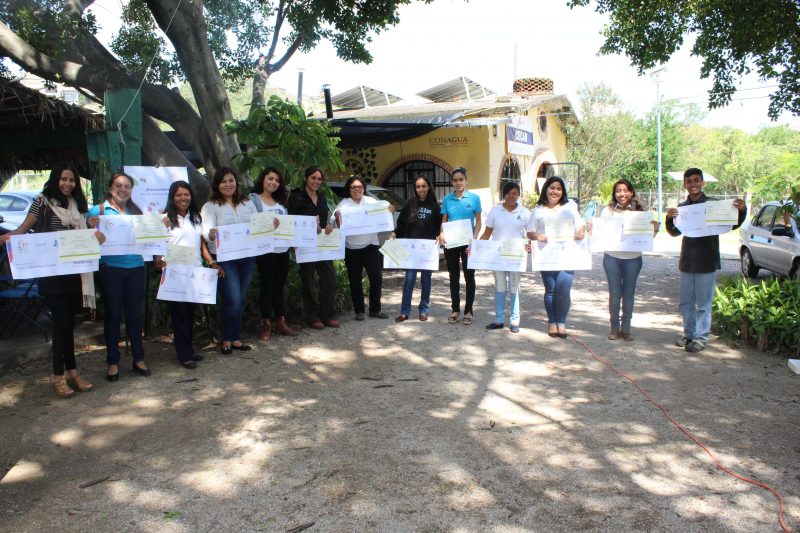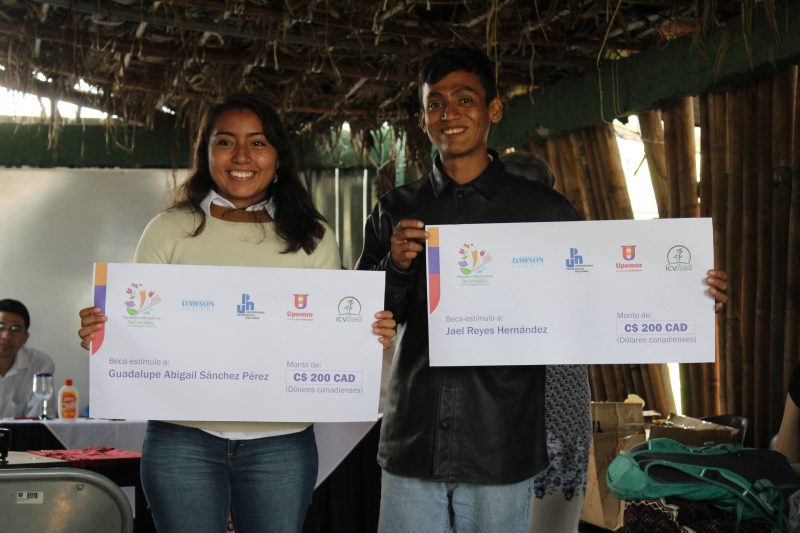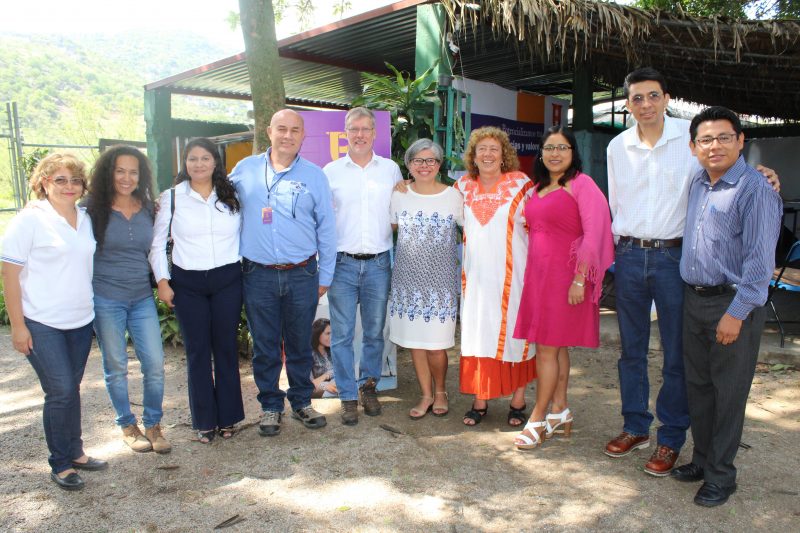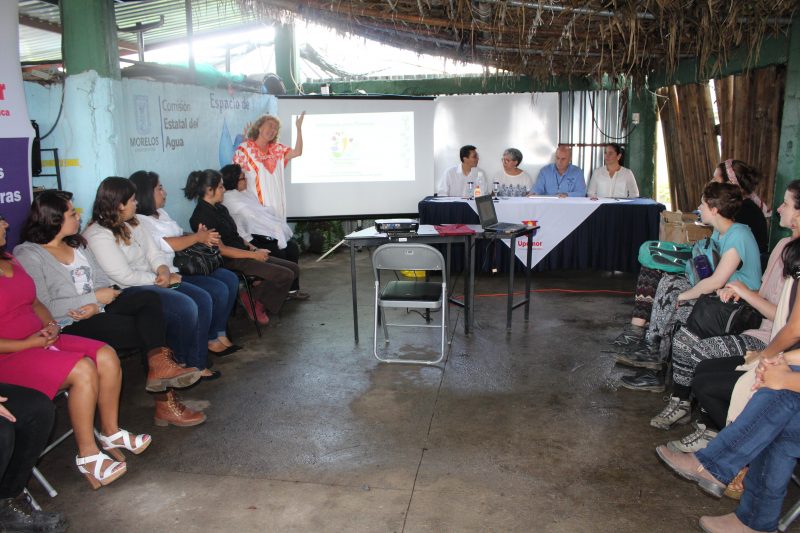Por Ruth Belinda Bustos Córdova
Galeana, Morelos, México
Translation to english by Gisela Frias (follows)
El pasado viernes 17 de junio, 2016 se realizó la entrega de becas-estímulo como parte del Proyecto, Planteles Educativos Sustentables “Una Comunidad Norte – Sur, para la Investigación-Acción”, otorgadas por SSHRC (Consejo de Investigación para las Ciencias Sociales y las Humanidades) a estudiantes que se han destacado por su promoción de acciones de sustentabilidad y quienes trabajaran en sus tesis ese tema. El impulso se lo han dado los proyectos de investigación que se realizan desde algunos años en colaboración entre estudiantes y académicos de Canadá y México, específicamente el Dawson College, la Universidad Pedagógica Nacional (UPN) Unidad 171, la Universidad Politécnica del Estado de Morelos (UPEMOR), su más nuevo integrante, la Preparatoria Comunitaria de Tres Marías de la Universidad Autónoma del Estado de Morelos (UAEM).
Esta actividad se convirtió en la posibilidad de fortalecer el trabajo que ya se viene haciendo para la construcción de redes de apoyo entre las distintas instituciones de educación superior y de impulso de acciones locales a favor de la atención y preservación del medio ambiente; que permitan resolver en lo local, problemas de orden global, con un enfoque ético, como una manera de solidarizarse con el otro, incluso con el que no se conoce, pues los efectos de estos proyectos tendrán alcances inimaginables.
En su texto “En búsqueda de la política”, Bauman (2002) se pregunta “¿Hay alguien capaz de hacer lo que haga falta hacer?” para generar una especie de conciencia colectiva que permita asumir una responsabilidad frente a las injusticias y los problemas humanos. Considero que cada uno de los estudiantes y egresados que fueron merecedores de los estímulos, han tomado en sus manos esa responsabilidad de la que cuestiona Bauman, le dan respuesta con sus acciones y los cambios en su trayectoria personal y académica al incursionar en la sustentabilidad para lograr modificar algo en su entorno inmediato.
Vale la pena señalar que este proyecto no solo ha tocado a los estudiantes o académicos, sino también a los diferentes actores de las comunidades universitarias que por compromiso personal suman esfuerzos. Todos ellos están haciendo lo que hacía falta hacer.
Con esto, se está realizando praxis para la formación de agentes ciudadanos; entendiendo por agencia, “la capacidad de los ciudadanos activos de organizarse, para enfrentar la indignación que les causa el presente y transformar su entorno social en la búsqueda de la vida buena para todos, utilizando sus saberes, movilizando recursos y asumiendo un posicionamiento moral” (Bustos y Saenger, 2013, 334).
Pero la agencia no se ejerce sola, se ejerce en colectivo, por eso, las acciones que este núcleo de agentes están realizando, tiene el reto de buscar involucrar a otros, incluso traspasando las fronteras políticas, para generar una ciudadanía planetaria. Indignémonos y hagamos, lo que haga falta hacer.
Bibliografia
Bauman, Z. 2002. En busca de la política 2ª Edición. Fondo de Cultura Económica. México.
Bustos, R. y Saenger, C. (2013) “La formación de la ciudadanía y la agencia en un dispositivo escolar en un contexto de diversidad sociocultural: la escuela indígena en la ciudad”, en Teresa Yurén y Carola Mick (coords.) Educación y Agencia: aproximaciones teóricas y análisis de dispositivos, Juan Pablos Editor.
_________________________
Forming citizens through sustainability
By Ruth Belinda Bustos Córdova
Galeana, Morelos, México
Translation by Gisela Frias
On Friday June 17, 2016 scholarships were given as part of the project, Sustainable Campuses “A North-South Research-Action Community” funded by SSHRC (Social Science and Humanities Research Council). The scholarships were given to students who have excelled in the promotion of sustainability actions and to those whose theses work is related to this topic. The motivation has come from research projects carried out for some years in collaboration between students and academics from Canada and Mexico, specifically Dawson College, the National Pedagogic University (UPN) Unit 171, the Polytechnic University of the State of Morelos ( UPEMOR) and its newest member, the Preparatory Community College of Tres Marias from the Autonomous University of the State of Morelos (UAEM).
This activity strengthened the work already carried out to build support networks among institutions of higher education and boost local actions for the care and preservation of the environment; to resolve local, while addressing global problems with an ethical approach, as a way to show solidarity with the other, even if the other is not known, since the effects of these projects will have unimaginable scope.
In his text “In search of politics”, Bauman (2002) asks “is there anyone able to do what is needed?” to generate a kind of collective consciousness that allows us to assume responsibility towards injustices and humanity’s problems. I believe that each of the students and graduates who were deserving of these scholarships, have taken in their hands that responsibility of which Bauman talks about, they respond to his question with their actions and through their personal transformation and that of their academic career, to venture into sustainability as a way to achieve change in their immediate environment.
It is worth noting that this project has not only affected students or scholars, but also different actors in their university communities who through their personal commitment have joined forces. They are doing what is needed.
With this, praxis is taking place for the formation of citizens as agents; understanding agency as “the ability of active citizens to organize themselves to face the outrage that the present conditions cause them and to transform their social environment in pursuit of the good life for all, using their knowledge, mobilizing resources and taking a moral position” (Bustos and Saenger, 2013, 334).
But agency is not exercised alone. It is exercised collectively. Therefore, the actions that this core group of agents are performing, have the challenge of seeking to involve others, even going beyond political boundaries, to generate a planetary citizenship. Lets all become outraged and do, whatever is needed.
Bibliography
Bauman , Z. 2002. In search of politics, 2nd Edition. Fondo de Cultura Economica. Mexico.
Bustos, R. and Saenger, C. (2013) “The formation of citizenship and agency in a school in a context of cultural diversity: indigenous school in the city”. In Teresa Yurén and Carola Mick (eds.) Education Agency: theoretical approaches and analysis devices. Ed. by Juan Pablos.






